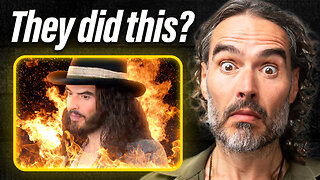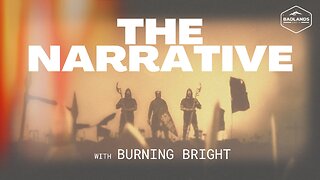Premium Only Content

Hasten to Your Light Psalm 119:60
Embrace the urgency of Psalm 119:60 today—turn to Jesus without delay, stripping away any pretense or hesitation. Be wholehearted in your loyalty to God, seek His mercy boldly, and commit to obedience even amidst life's snares. Let this song be your anthem: sing it, live it, and watch how swift surrender transforms your walk with Him. Start now—reflect on His commands and step forward in faith! Like subscribe and comment. I read all comments.
Hasten to Your Light
Verse 1
In the quiet of my soul, I hear Your call so clear
No more waiting in the shadows, drawing ever near
You see right through my heart, no masks or empty show
With open arms You wait, in mercy's gentle flow
Chorus
I hasten to Your commands, no delay in my step
Turning to Jesus now, in Your love I'm kept
Wholehearted in my loyalty, seeking mercy's grace
Obedience is my song, even in the darkest place
Among the snares that surround me, I run into Your light
It's always good to turn to You, day or night
Verse 2
You know me as I am, no need to temporise
No airs or hidden games, just truth before Your eyes
In trials and in tempests, Your Word becomes my shield
I choose to follow swiftly, in surrender I yield
Chorus
I hasten to Your commands, no delay in my step
Turning to Jesus now, in Your love I'm kept
Wholehearted in my loyalty, seeking mercy's grace
Obedience is my song, even in the darkest place
Among the snares that surround me, I run into Your light
It's always good to turn to You, day or night
Bridge
Oh, let my feet be swift, my heart forever true
No hesitation, Lord, I'm running straight to You
Mercy falls like rain, washing all my fears away
In Your presence, I find strength for every day
Chorus (x2)
I hasten to Your commands, no delay in my step
Turning to Jesus now, in Your love I'm kept
Wholehearted in my loyalty, seeking mercy's grace
Obedience is my song, even in the darkest place
Among the snares that surround me, I run into Your light
It's always good to turn to You, day or night
=
### Background of the Composition
Psalm 119 is the longest chapter in the Bible, comprising 176 verses, and is structured as an elaborate acrostic poem in Hebrew. It is divided into 22 stanzas, each corresponding to one of the 22 letters of the Hebrew alphabet (from Aleph to Taw). Within each stanza, there are exactly eight verses, and every verse begins with the respective Hebrew letter. This alphabetic structure likely served as a mnemonic device to aid memorization, a common technique in ancient Hebrew literature, similar to patterns found in other biblical texts like Lamentations 3 or Proverbs 31:10–31. The psalm is anonymous, with no explicit author named in the text, though it has been traditionally attributed to King David in Jewish and early Christian sources, including the Talmud, Midrash, and commentators like Rashi and Radaq. Alternative proposals suggest it could have been written by Ezra or one of his disciples during the post-exilic period, or even by the prophet Daniel, based on thematic emphases on Torah devotion amid persecution. Some scholars view it as a compilation developed over time, lacking a single linear narrative and instead functioning like a "string of pearls," where each section holds independent value while collectively praising God's revelation.
Thematically, the psalm is a profound meditation on the Word of God, with at least 171 of its verses referencing Scripture using eight key synonyms: "law" (torah), "word" (dabar), "judgments" (mispatim), "testimonies" (edut/edot), "commandments" (miswah/miswot), "statutes" (huqqim), "precepts" (piqqudim), and "word/promise" (imrah). It expresses the psalmist's deep love, delight, and determination to obey God's instructions, portraying them as a source of guidance, revival, comfort, and eternal truth amid personal trials. The composition reflects a personal devotion, possibly written as a series of reflections or prayers, emphasizing running the path of God's commandments with joy and resolve.
### Historical Perspective
The Book of Psalms as a whole is a collection of 150 ancient Hebrew poems, songs, and prayers spanning various eras in Israel's history, from the time of Moses to the post-exilic period (after the Babylonian exile in the 6th century BCE). Psalm 119 likely originates from the post-exilic era, around the time of Ezra and Nehemiah (5th–4th centuries BCE), when there was a renewed emphasis on Torah observance following the return from Babylonian captivity. This period was marked by efforts to rebuild Jewish identity, temple worship, and adherence to the law amid external opposition and internal spiritual decline. The psalmist's references to affliction, persecution by the "wicked" and "proud" who consider God's law "void," and pleas for divine intervention suggest a context of societal and personal challenges where faithfulness to Scripture was tested.
If attributed to David (circa 10th century BCE), it would fit an earlier monarchic period of Israel's history, potentially composed across his lifetime amid his own trials, such as fleeing from Saul or dealing with personal sin. However, the psalm's heavy focus on the written Torah aligns more closely with later developments in Jewish thought, post-Mosaic law codification. In Eastern Orthodox tradition, it was said to have been used by David to teach his son Solomon both the Hebrew alphabet and a "spiritual alphabet" of divine wisdom.
Throughout history, Psalm 119 has held significant influence. In the medieval and Reformation eras, it was highly valued; Martin Luther prized it above worldly riches, and Puritan preacher Thomas Manton wrote a massive three-volume commentary on it. Figures like John Ruskin, William Wilberforce, Henry Martyn, and David Livingstone memorized it for spiritual sustenance. In the 17th century, Scottish martyr George Wishart had it sung before his execution, and his pardon arrived mid-psalm, sparing his life. Its enduring appeal lies in its timeless call to cherish God's Word as a source of blessing and resilience.
### Meaning of Psalm 119:60
Psalm 119:60 reads: "I hastened and did not delay to keep Your commandments" (ESV; similar in NIV, KJV, and other translations). This verse falls within the "Heth" stanza (verses 57–64), which emphasizes wholehearted loyalty to God as one's "portion," seeking mercy, self-reflection, prompt obedience, and fellowship with those who fear the Lord, even amid the "snares" of the wicked.
The meaning centers on the urgency and immediacy of obedience to God's commands. Building on verse 59 ("I considered my ways and turned my feet to Your testimonies"), the psalmist describes not just deciding to obey but doing so without hesitation or procrastination—hastening forward as if fleeing danger or seizing an opportunity. Commentaries interpret this as a model for conversion and daily faithfulness: upon recognizing duty or sin, one should act swiftly, without consulting "flesh and blood" or delaying for a "more convenient time." Biblical parallels include the immediate responses in Acts (e.g., the 3,000 converts at Pentecost, Saul's conversion, or the Philippian jailer), underscoring that "now is the accepted time" for repentance and obedience (2 Corinthians 6:2).
Theologically, it highlights the wisdom of prompt action in glorifying God and escaping sin's traps, contrasting with human tendencies to postpone spiritual commitments. In a broader sense, it symbolizes prioritizing God's authority, fostering a life of evangelical obedience that brings blessing and aligns with the psalm's overarching theme of delight in divine law.
=
### Advice on Playing the Song
This worship song, inspired by Psalm 119:60 in a Hillsong or Bethel style, should embody a contemporary Christian music vibe—anthemic, emotive, and building in intensity to draw worshippers into a sense of urgency and surrender. Contemporary worship songs like those from Hillsong and Bethel often feature mid-tempos around 70-80 BPM for reflective yet driving tracks, with common use of tempo and dynamic changes for emotional build. Aim for a tempo of 72-76 BPM to capture the "hastening" theme without rushing, allowing space for heartfelt delivery. Use a 4/4 time signature with a straight rhythm, incorporating subtle syncopation in the verses for introspection, then a steady kick-snare drive in the chorus to evoke forward momentum.
For instruments, mirror the full band setups typical in Hillsong and Bethel productions: start sparse and build layers. Core lineup includes:
- **Vocals**: Lead singer with warm, expressive tone (e.g., like Brooke Ligertwood or Jenn Johnson), backed by 3-5 harmony vocalists for rich, layered choruses. Encourage congregational sing-along in the chorus.
- **Acoustic Guitar**: Primary rhythm driver, using open chords (e.g., G, D, Em, C in key of G major) with fingerpicking or light strumming in verses for intimacy, then fuller strums in choruses.
- **Electric Guitar**: Two if possible—one for ambient swells and delays (pedals like reverb, delay, overdrive for Bethel-style atmospheres), another for melodic leads in the bridge. Use effects to create ethereal builds.
- **Keys/Piano/Synth**: Piano for intro/verses with simple arpeggios; synth pads for atmospheric depth throughout, swelling in the bridge to heighten emotion.
- **Bass Guitar**: Steady root notes following the chord progression, locking with drums for groove; add subtle walks in transitions.
- **Drums/Percussion**: Full kit with a mid-tempo groove—kick on 1 and 3, snare on 2 and 4. Start light (hi-hat only in Verse 1), build with toms and cymbals in choruses for energy. Use cajon or shaker for acoustic versions.
Arrangement tips: Begin softly with piano and acoustic guitar in Verse 1 to set a contemplative mood, reflecting self-examination. Build into the chorus with full band entry for the "hasten" declaration, using dynamics—quiet verses (piano/mezzo-piano), explosive choruses (forte). Modulate up a half-step in the final chorus for uplift. In the bridge, strip back to keys and vocals for intimacy, then crescendo. For live worship, loop the chorus at the end with ad-libs like "I run to You" to extend the moment. Practice smooth transitions to maintain flow, and focus on emotional authenticity to avoid manipulation critiques common in this genre. Rehearse with a click track for tightness, and record a demo to refine tones.
-
 5:57
5:57
oDDBall daily bible quotes
1 month agoSeek first His kingdom
205 -
 1:48:26
1:48:26
Tucker Carlson
2 days agoKristen Breitweiser: 9-11 Cover-Ups, Building 7, and the Billion-Dollar Scam to Steal From Victims
138K364 -
 5:48
5:48
Russell Brand
2 days agoThey BURNED me in effigy!
40.2K31 -
 1:21:40
1:21:40
Man in America
4 hours agoThe Secret AI Plan to Enslave Humanity — And Why It Will FAIL w/ Todd Callender
25.7K5 -
 2:18:17
2:18:17
TheSaltyCracker
4 hours agoTreason Season ReeEEStream 11-23-25
129K145 -
 3:10:33
3:10:33
Badlands Media
21 hours agoThe Narrative Ep. 47: Arctic Alliance
42K5 -
 LIVE
LIVE
SpartakusLIVE
3 hours agoLIVE from the Creator House in FLORIDA || WZ Solos to Start - PUBG, REDSEC or ARC Later?!
426 watching -
 58:03
58:03
MattMorseTV
4 hours ago $53.50 earned🔴Trump is BRINGING the CHARGES. 🔴
54.8K133 -
 DVR
DVR
EricJohnPizzaArtist
4 days agoAwesome Sauce PIZZA ART LIVE Ep. #70: Movie Night featuring Dark Helmet!
30.6K8 -
 2:06:00
2:06:00
Joker Effect
3 hours agoMASSIVE UPDATES ON MY CHANNEL... what does 2026 look like? CHATTIN WITH WVAGABOND (The Captain).
15.8K2